
Alabama is a state in the southeastern region of the United States. It is bordered by Tennessee to the north, Georgia to the east, Florida and the Gulf of Mexico to the south, and Mississippi to the west. Alabama is the 30th largest by area and the 24th-most populous of the U.S. states. With a total of 1,500 miles (2,400 km) of inland waterways, Alabama has among the most of any state.

Mobile is the county seat of Mobile County, Alabama, United States. The population within the city limits was 195,111 as of the 2010 United States Census, making it the third-most-populous city in Alabama, the most populous in Mobile County.
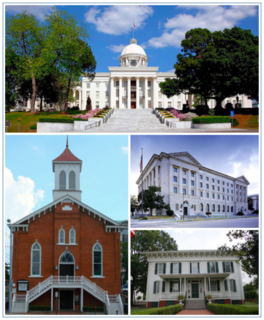
Montgomery is the capital city of the U.S. state of Alabama and the county seat of Montgomery County. Named for Richard Montgomery, it stands beside the Alabama River, on the coastal Plain of the Gulf of Mexico. In the 2010 Census, Montgomery's population was 205,764. It is the second most populous city in Alabama, after Birmingham, and is the 118th most populous in the United States. The Montgomery Metropolitan Statistical Area's population in 2010 was estimated at 374,536; it is the fourth largest in the state and 136th among United States metropolitan areas.

Bibb County is a county in the central portion of the U.S. state of Alabama. The county is included in the ARC's definition of Appalachia. As of the 23rd Decennial 2010 United States Census, its population was 22,915. The county seat is Centreville. The county is named in honor of William W. Bibb (1781-1820), the Governor of Alabama Territory (1817-1819) and the first Governor of Alabama. He is also the namesake for Bibb County, Georgia, where he began his political career. It is a "prohibition" or dry county; however, a few towns have become "wet" by allowing the sale of alcoholic beverages: Woodstock (12/2017), West Blocton (08/2012), Centreville (06/2010), and Brent (05/2010).

William Rufus DeVane King was an American politician and diplomat. He was the 13th vice president of the United States for six weeks in 1853 before his death. Earlier he had been elected as a U.S. representative from North Carolina and a senator from Alabama. He also served as minister to France during the reign of King Louis Philippe I.
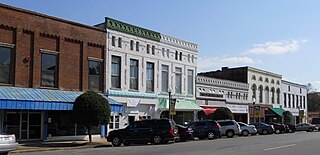
Talladega is the county seat of Talladega County, Alabama, United States. It was incorporated in 1835. At the 2010 census the population was 15,676. Talladega is approximately 50 miles (80 km) east of Birmingham.
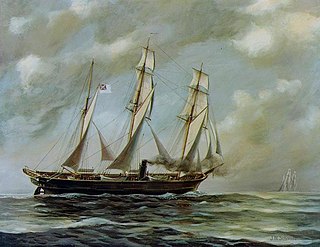
The Alabama Claims were a series of demands for damages sought by the government of the United States from the United Kingdom in 1869, for the attacks upon Union merchant ships by Confederate Navy commerce raiders built in British shipyards during the American Civil War. The claims focused chiefly on the most famous of these raiders, the CSS Alabama, which took more than sixty prizes before she was sunk off the French coast in 1864.

George Corley Wallace Jr. was an American Democratic Party politician who served as the 45th Governor of Alabama for four terms. He is best remembered for his staunch segregationist and populist views. During his tenure, he promoted "low-grade industrial development, low taxes, and trade schools". He sought the United States presidency as a Democrat three times, and once as an American Independent Party candidate, unsuccessfully each time. Wallace opposed desegregation and supported the policies of "Jim Crow" during the Civil Rights Movement, declaring in his 1963 inaugural address that he stood for "segregation now, segregation tomorrow, segregation forever". In 1965, Martin Luther King Jr. called Wallace "perhaps the most dangerous racist in America today".

The Tennessee River is the largest tributary of the Ohio River. It is approximately 652 miles (1,049 km) long and is located in the southeastern United States in the Tennessee Valley. The river was once popularly known as the Cherokee River, among other names, as many of the Cherokee had their territory along its banks, especially in eastern Tennessee and northern Alabama. Its current name is derived from the Cherokee village Tanasi.
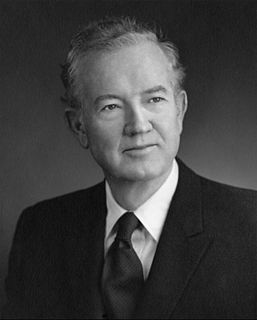
John Jackson Sparkman was an American jurist and politician from the state of Alabama. A Southern Democrat, Sparkman served in the United States House of Representatives and the United States Senate from 1937 until 1979. He was also the Democratic Party's nominee for Vice President in the 1952 presidential election.
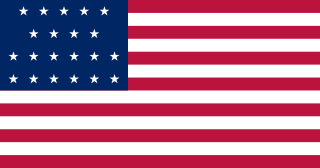
The Territory of Alabama was an organized incorporated territory of the United States. The Alabama Territory was carved from the Mississippi Territory on August 15, 1817 and lasted until December 14, 1819, when it was admitted to the Union as the twenty-second state.
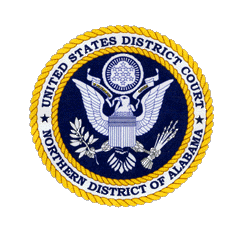
The United States District Court for the Northern District of Alabama is a federal court in the Eleventh Circuit.

The William B. Bankhead National Forest is one of Alabama's four National Forests, covering 181,230 acres (733 km2). It is home to Alabama's only National Wild and Scenic River, the Sipsey Fork. It is located in northwestern Alabama, around the town of Double Springs. It is named in honor of William B. Bankhead, a longtime U.S. Representative from Alabama.
The University of Alabama School of Law, ranked 31st by U.S. News, located in Tuscaloosa, Alabama is a nationally ranked top-tier law school and the only public law school in the state. It is one of five law schools in the state, and one of three that are ABA accredited. According to Alabama's official 2017 ABA-required disclosures, 84% of the Class of 2017 obtained full-time, long-term, JD-required employment nine months after graduation. An additional 8.4% of the Class of 2017 obtained JD-advantage employment.

The Wiregrass Region—or Wiregrass Country—is an area of the Southern United States encompassing parts of southern Georgia, southeastern Alabama, and the Florida Panhandle. The region is named for the native Aristida stricta, commonly known as wiregrass due to its texture.

Frank Minis Johnson Jr. was a United States District Judge and United States Circuit Judge serving 1955 to 1999 on the United States District Court for the Middle District of Alabama, United States Court of Appeals for the Fifth Circuit and United States Court of Appeals for the Eleventh Circuit. He made landmark civil rights rulings that helped end segregation and disenfranchisement of African Americans in the South. In the words of journalist and historian Bill Moyers, Judge Johnson "altered forever the face of the South."

The following outline is provided as an overview of and topical guide to the U.S. state of Alabama:

















